Peter Schiff: “I am a 100% convinced that anybody who has their wealth in US Dollars will be just as broke as the people who had their money with Madoff.”
(All 6 parts are a must-see.)
Part 1 of 6
Source: YouTube
The man who trades freedom for security does not deserve nor will he ever receive either. – Benjamin Franklin
(All 6 parts are a must-see.)
Part 1 of 6
Source: YouTube
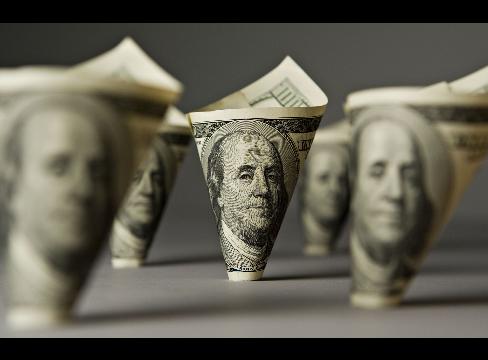
U.S. one hundred dollar bills are displayed for a photograph in New York on Dec. 30, 2008. Photographer: Daniel Acker/Bloomberg News
Dec. 31 (Bloomberg) — The dollar fell, heading for its worst annual decline against the yen in more than two decades, on speculation a U.S. report this week will show manufacturing shrank at the fastest pace since 1980.
The currency was also poised for a third annual loss versus the Swiss franc on bets the Federal Reserve’s zero target lending rate will weigh on demand for the greenback. The euro was set for the largest annual gain against the British pound since its 1999 debut on speculation the Bank of England will keep its main lending rate lower than the European Central Bank’s rate.
Read moreDollar Declines Against Euro, Heads for Biggest Drop Versus Yen Since 1987
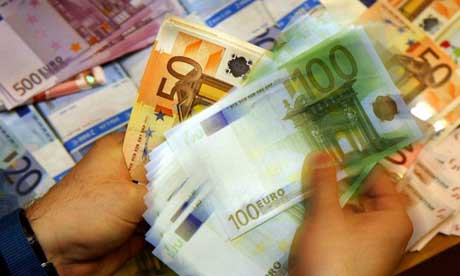
A pound is now worth €1.1391. Photograph: Toby Melville/PA
The pound has hit a new all-time low against the euro following further warnings that the UK economy is in worse shape than expected.
Sterling fell to €1.1391 this morning and also hit a record low against a basket of other currencies.
The pound’s latest weakness came as economists warned Britain’s economy was deteriorating faster than expected and could suffer badly in 2009.
The National Institute of Economic and Social Research warned today that the UK’s gross domestic product shrank by 1% in the three months to November, more than the official estimates.
Howard Archer, the chief European and UK economist at IHS Global Insight, said he expected to see a further “substantial contraction” in the first half of 2009 and that there was unlikely to be any growth until 2010. He is predicting a 2% drop in GDP next year.
Some British politicians considering signing up to single currency in bid to beat effects of global economic crisis, according to José Manuel Barroso
The UK is “closer” to joining the euro than ever before, according to the president of the European commission.
José Manuel Barroso said some British politicians were considering signing up to the single currency in a bid to beat the effects of the global economic crisis.
He told French radio station RTL: “We are now closer than ever before.
“I’m not going to break the confidentiality of certain conversations, but some British politicians have already told me, ‘If we had the euro, we would have been better off.'”
Read moreUK closer to joining euro, EU commission president says
The crisis in Hungary recalls the heady days of the UK’s expulsion from the ERM.
The financial crisis spreading like wildfire across the former Soviet bloc threatens to set off a second and more dangerous banking crisis in Western Europe, tipping the whole Continent into a fully-fledged economic slump.
Currency pegs are being tested to destruction on the fringes of Europe’s monetary union in a traumatic upheaval that recalls the collapse of the Exchange Rate Mechanism in 1992.
“This is the biggest currency crisis the world has ever seen,” said Neil Mellor, a strategist at Bank of New York Mellon.
Experts fear the mayhem may soon trigger a chain reaction within the eurozone itself. The risk is a surge in capital flight from Austria – the country, as it happens, that set off the global banking collapse of May 1931 when Credit-Anstalt went down – and from a string of Club Med countries that rely on foreign funding to cover huge current account deficits.
The latest data from the Bank for International Settlements shows that Western European banks hold almost all the exposure to the emerging market bubble, now busting with spectacular effect.
They account for three-quarters of the total $4.7 trillion £2.96 trillion) in cross-border bank loans to Eastern Europe, Latin America and emerging Asia extended during the global credit boom – a sum that vastly exceeds the scale of both the US sub-prime and Alt-A debacles.
Sept. 2 (Bloomberg) — The best already may be over for the U.S. stock market this year.
The Standard & Poor’s 500 Index, which had the worst first half since 2002, added 0.2 percent this quarter, the only gain among the world’s 10 biggest markets in dollar terms. Shares in the benchmark index for American equity climbed to an average 25.8 times reported profits, the highest valuation in five years. The last time that happened, the S&P 500 fell 38 percent.
Read moreU.S. Stocks at 25.8 Times Earnings Means Rally Can’t Continue
The pound has fallen to its weakest level in 12 years after the Bank of England signalled that it is no longer prepared to raise interest rates.
Sterling dipped sharply against both the dollar and the euro after the Bank used its quarterly Inflation Report to slash its economic growth forecasts and predicted that inflation will dip back towards its 2pc target over the next two years.
And because of this Wall Street is celebrating today, but not for long.
Before: Fed: No more bailouts, except Fannie Mae and Freddie Mac
And now the Fed wants to bailout Wall Street?
The taxpayer will pay for it all.
__________________________________________________________________________________

WASHINGTON (AP) – The Federal Reserve said Wednesday it is extending its emergency borrowing program to Wall Street firms and is taking other steps to ease a severe credit crunch that has hobbled the national economy.
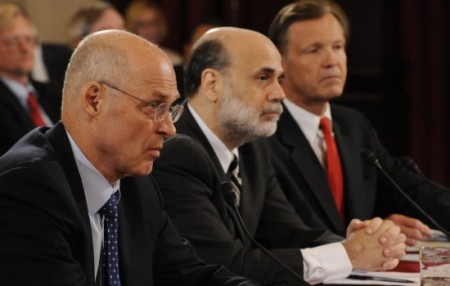
NEW YORK: In the narrative that has governed American commercial life for the last quarter-century, saving companies from their own mistakes was not supposed to be part of the government’s job description. Economic policymakers in the United States took swaggering pride in the cutthroat but lucrative form of capitalism that was supposedly indigenous to their frontier nation.
So Inflation is really the greatest export of the US.
_____________________________________________________________________________________

LONDON (Reuters) – Three days before the last bout of coordinated central bank intervention to calm world currency markets, the International Monetary Fund’s top economist opined: “If not now, when?” Many experts are now asking the same.
Merrill Lynch has warned that the United States could face a foreign “financing crisis” within months as the full consequences of the Fannie Mae and Freddie Mac mortgage debacle spread through the world.

Draining away: The US may struggle to plug its capital gap
The country depends on Asian, Russian and Middle Eastern investors to fund much of its $700bn (£350bn) current account deficit, leaving it far more vulnerable to a collapse of confidence than Japan in the early 1990s after the Nikkei bubble burst. Britain and other Anglo-Saxon deficit states could face a similar retreat by foreign investors.
Read moreUS faces global funding crisis, warns Merrill Lynch
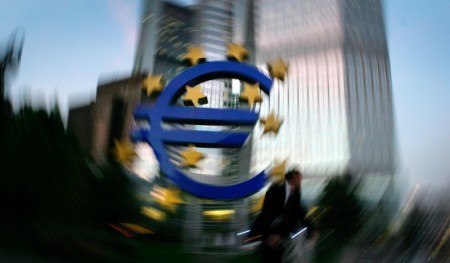
FRANKFURT: The European Central Bank, spooked by soaring prices for food and fuel, raised interest rates Thursday, joining several other central banks in battling a global eruption of inflation.
The quarter-point hike, which the bank had signaled last month, had little initial effect on markets, with the euro treading water against the dollar and stocks staying relatively steady. Central banks in Sweden and Norway also raised rates this week, citing inflation. On Thursday, Indonesia raised its key interest rate for the third time this year, while India raised its key lending rate twice last month.
The Federal Reserve in the United States, where short-term interest rates are only half of those in Europe, has so far declined to join them.
The European Central Bank’s decision deepens a recent divergence in monetary policy across the Atlantic, ending a long period when it tended to follow the course set by the Fed.
But the sharp rise in inflation has put Europe’s bank into a policy bind because it has been accompanied, in recent days, by evidence that the economy here is deteriorating much like that of the United States.
Manufacturing activity in the 15 countries that use the euro shrank in June for the first time in three years, according to a survey of European purchasing managers. In Spain and Ireland, where a collapse in housing prices has magnified the problems, there is a real risk of recession.
Still, the European Central Bank, hewing to its inflation-fighting mandate, pressed on with the expected increase, moving the benchmark rate to 4.25 percent from 4 percent. Among other things, it is intended as a warning to unions not to use higher inflation as a lever to demand hefty wage increases.
_____________________________________________________________________________________
Say goodbye to the Dollar and to Wall Street.
Got Gold and Silver? – The Infinite Unknown
Related articles and videos:
– Dow suffers worst 1st half since ‘70
– Fortis Bank Predicts US Financial Market Meltdown Within Weeks
– Barclays warns of a financial storm as Federal Reserve’s credibility crumbles
– Jim Rogers: Avoid The Dollar At All Costs
– Ron Paul on Iran and Energy June 26, 2008
– Marc Faber: ‘Misleading’ Fed Should Let Banks Fail
_____________________________________________________________________________________
It was not clear, before an afternoon news conference chaired by the bank’s president, Jean-Claude Trichet, whether the rate increase would be a one-time gesture or the start of a cycle of tighter monetary policy.
Several economists said they doubted the bank could tighten much further, given the parlous economic situation.
“The ECB is hiking at a time when confidence is plummeting,” said Thomas Mayer, the chief European economist at Deutsche Bank. “The question is, ‘what do you do when asset prices fall at the same time that consumer prices rise?’ The central bankers seem to have reached the end of the line.”
They say that pictures speak a thousand words, so let’s start this with a picture:
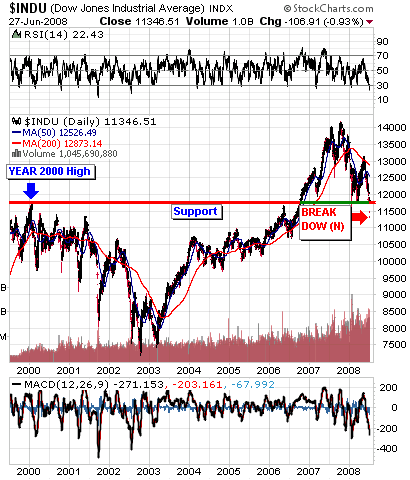
Today, the Dow crashed through its eight-year support level at 11,750. There isn’t much below now to keep it from dropping all the way back down to the 7,500-range. What that will do to American investor psychology and worse, consumer confidence, and therefore spending, and therefore the economy, is only too apparent.
The gold-attack on Monday obviously didn’t take. Gold recovered the following day and powered up by $26 the very next day to close in NY at $911. On Friday, gold confirmed its breakout, which means there will be little holding it back – just like there is now very little that’s holding the Dow up.
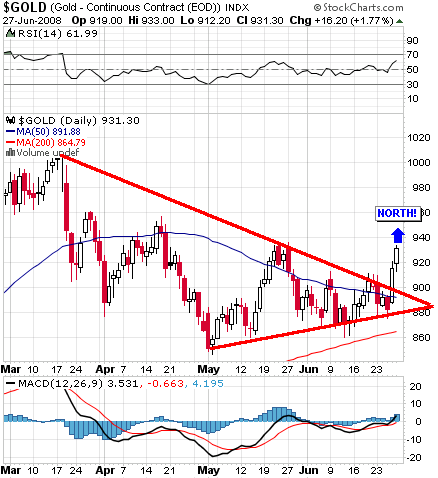
Unsurprisingly, the US war machinery is in full swing at this time. Troop and military asset movements into the Iranian theater are nearly complete, the Israelis have flown their practice-attack of 100-plus fighter jets over the Mediterranean, and Congress has again prostrated itself before its banking-guild rulers who want total government (and therefore banking) of all economic activity.
Congress did this by passing the FISA Amendments Act of 2008 to give retroactive immunity to telcoms spying for the government, and by proposing a resolution (the already infamous H. Con. Res. 362) by which Congress demands that Bush completely blockade Iran in order to force it to stop enriching uranium. This, naturally, is a perfect setup for unleashing the long-planned bombing campaign on Iran. Congressmen know that Iran will not accede to these international demands.
End result: We will probably get another war because of all this, just like we got one back in 2002-03 when the Dow plunged into the chasm this recently broken support level has bridged for these past eight years (see chart above).
The problem is that this time, it is a bipartisan gang of US war mongers in our Congress who all appear hell-bent on forcing Bush to attack Iran with a preemptive strike, possibly even an unprovoked nuclear first strike – something that human history so far has not had to deal with.
It is also something that will cause the US to forfeit any legitimate claims of world leadership for the remainder of that history.
The War Currency
Wars are rarely fought over national security issues, as political leaders often claim. At rock bottom, they are mostly fought over economic issues.
Iraq and Iran (if Congress and the administration get their way) are the only two countries the US has ever attacked preemptively. They are also the only two oil-producing countries that ever went off the petrodollar. The alleged nuclear ambitions of a terrorist-sponsoring country cannot be the real reason for the planned attack – because terrorist-sponsor North Korea was not only allowed to develop nuclear weapons unmolested, it was even allowed to test-launch a potentially nuclear-tipped ICBM at the US without any military repercussions whatsoever.
There goes the “national security” rationalization for this planned attack.
This fact exposes the attacks for what they really are. tools of US monetary policy. The dollar has no real value internationally, save for the fact that the now militarily enforced necessity for countries to buy dollars in order to buy oil creates artificial demand.
The euro’s existence threatens all of this, now. Oil countries have a dollar-alternative in the euro, and so does the rest of the world. The euro is designed to not be quite as inflationary as the dollar is and has been. This is done by virtue of the ECB’s exclusive mandate of “price stability”, another word for inflation fighting.
Yet Another War Currency
June 27 (Bloomberg) — European confidence dropped more than economists forecast this month and retail sales plunged, signaling that economic growth is continuing to cool even as the European Central Bank prepares to lift interest rates to a seven-year high to tackle inflation.
An index measuring sentiment in the euro area fell to 94.9, the lowest since May 2005, from 97.6 the previous month, the European Commission in Brussels said today. Separate reports showed European retail sales plummeted, while inflation accelerated in Germany and Spain.
Stocks fell in Europe today as oil climbed to a record above $140 a barrel and Carrefour SA, Europe’s biggest retailer, scaled back its earnings forecast. With soaring food and energy prices boosting inflation, ECB President Jean-Claude Trichet has said the bank may raise the benchmark rate next week by a quarter point to 4.25 percent.
``The economy has hit the wall,” said Ken Wattret, senior economist at BNP Paribas SA in London. ECB officials “run the risk of tipping the euro area into a recession” as the inflation outlook increases the risk that the central bank “may need to go beyond one rate rise.”
Confidence among the manufacturing, construction and retail industries across the 15 nations that share the euro declined this month, as did consumer sentiment, according to today’s commission report.
The Bloomberg retail index, based on a survey of more than 1,000 executives compiled by Markit Economics, fell to 44 this month from 53.1 in May. A reading below 50 indicates contraction. Europe’s manufacturing and services industries also contracted this month.
Export Growth
The euro has increased 17 percent against the dollar in the last 12 months, threatening export growth, and was at $1.5770 today. The Dow Jones Stoxx 600 index fell 1.3 percent to 284.67 as of 11:29 a.m. in Brussels.
Separate figures today showed France’s economy expanded less than initially estimated in the first quarter as household spending, the driving force of growth, stagnated. U.K. first- quarter growth was revised lower today.
ECB council member Miguel Angel Fernandez Ordonez said today a July rate increase is not a certainty.
“Nothing is inevitable in life,” Ordonez told reporters in Rome today. “What we said was that the increase is not certain, but possible.”
Still, the ECB remains focused on consumer-price growth, according to ECB Executive Board member Juergen Stark. He said yesterday the bank sees its primary aim as being to “firmly anchor inflation expectations.”
16-Year High
Euro-area inflation reached a 16-year high of 3.7 percent in May. In Spain, inflation accelerated to 5.1 percent this month, the fastest on record, according to data today. Inflation in four German states also accelerated this month.
Oil prices have doubled in a year and Libyan National Oil Corp. Chairman Shokri Ghanem said yesterday that $150 a barrel may be “around the corner.”
Companies expect to raise prices more than previously anticipated to recover soaring costs, the commission report showed. A gauge of companies’ selling-price expectations rose to 18 in June from 16 in May, which compares with an average reading of 6 over the last 18 years. Consumers also expect prices to rise more sharply than they did last month.
The “worrying combination” of falling confidence and rising price expectations, “will add to fears of stagflation in the euro zone,” said Martin van Vliet, an economist at ING Group in Amsterdam.
`Remain Elevated’
“Inflation is likely to remain elevated for a longer period than we initially expected,” EU Monetary Affairs Commissioner Joaquin Almunia said in London today. It “should only begin to show a significant deceleration around the end of this year, although further possible rises in the price of oil and agricultural products cannot be ruled out.”
Eurozone inflation surged to the highest rate for 16 years on the back of sharply higher oil prices as consumer spending in the 15-country region showed further signs of weakness.
Annual inflation in the eurozone reached 3.6 per cent in May, according to official data released on Friday, up from 3.3 per cent in the previous month. That appeared to rule out any chance of an early cut in interest rates by the European Central Bank, which aims to keep inflation “below but close” to 2 per cent.
Evidence also emerged that higher prices were wreaking economic damage by forcing households to retrench. Germany reported a surprise 1.7 per cent drop in April retail sales, extending a 2.2 per cent fall in March.
This week, the European Commission reported eurozone consumer confidence had plunged in May to its lowest level for almost three years.
As well as driving inflation higher, the soaring cost of fuel has led to Europe-wide protests this week – with fishermen blocking ports in France and on Friday giving out fish free in Madrid.
Jean-Claude Juncker, the EU’s ‘Mr Euro’, has given the clearest warning to date that the world authorities may take action to halt the collapse of the dollar and undercut commodity speculation by hedge funds.

Jean-Claude Juncker, who is calling for Washington to
take steps to halt the slide of the dollar
Momentum traders have blithely ignored last week’s accord by the G7 powers, which described “sharp fluctuations in major currencies” as a threat to economic and financial stability. The euro has surged to fresh records this week, touching $1.5982 against the dollar and £0.8098 against sterling yesterday.
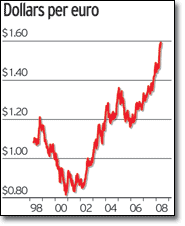
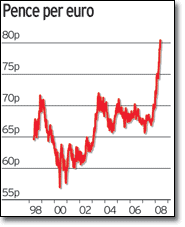
“I don’t have the impression that financial markets and other actors have correctly and entirely understood the message of the G7 meeting,” he said.
Mr Juncker, who doubles as Luxembourg premier and chair of eurozone financiers, told the Luxembourg press that he had been invited to the White House last week just before the G7 at the urgent request of President George Bush. The two leaders discussed the dangers of rising “protectionism” in Europe. Mr Juncker warned that matters could get out of hand unless America took steps to halt the slide in the dollar.
“The only thing that worries me permanently about the China story is water.
I’ve been around the world twice. I’ve seen many cities, societies, [and] nations that disappeared because the water disappeared. China has a huge water problem. In Northern China, they’re running out of water. They know this and they’re working on it, big time. But if they don’t solve it, or if they don’t solve it in time, then China – as you put it – has failed.
By the way, Northern India has the same problem, only worse. Many places have it now. Water is becoming a huge problem worldwide. The same is true in the Southwestern United States. You know, you may have Arizona going to war with California. Some sections of Nevada, Colorado …they’re desperate there.
So it’s not just China – but water’s the main thing that worries me about China.”
(As I said: In ten years the glaciers in the Himalaya region will be gone and 50% of the worlds population will have not enough or no water at all. The governments know this and they won’t sit & wait and do nothing about it. There will be World Water Wars.
And if China where to lose a million soldiers in a war so what. To them their soldiers have the same worth than to the US their soldiers in Iraq: They are considered as canon fodder.
If you think that this is wrong than I recommend the movie “NO End In Sight” (2007) as a first eye-opener.
Please read the whole article. – The Infinite Unknown)
Read moreJim Rogers: China’s Economic Advance is All But Unstoppable
Federal Reserve Chairman Ben Bernanke has reduced the key federal funds rate six times in as many months — reducing the cost for major borrowers significantly. This combines with providing $270 million in funding, plus $30 billion in additional guarantees, for JP Morgan Chase to buy Bear Stearns Cos.
“Helicopter Ben” is living up to the nickname he earned after he remarked in a 2002 speech that he would stave off a recession even if he had to drop money from helicopters to do it.
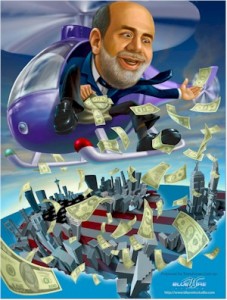
The results of these policies have been destructive. The dollar is collapsing not only against foreign currencies — we’re now at par with the Canadian dollar and rocketing toward a 2-1 deficit against the Euro — but also against commodities. Gold was passing the $1,000-an-ounce landmark, silver $20. Even industrial metals like copper and zinc are fetching record prices.
Now, a spike in a particular commodity — say, for instance, $100-per-barrel oil — can be attributed to a shortage. But when they all move dramatically and simultaneously, it’s the purchasing power of our money that has gone down.
In fact, the increasing cost of even the base metals recently prompted Edmund Moy, director of the United States Mint, to propose further debasing the copper and nickel-plated, zinc slugs we call coins by substituting color-coated steel.
CARACAS, Venezuela: Venezuela’s state-run oil firm is starting to demand payment in euros a measure aimed at protecting revenues from a weakening U.S. dollar, Venezuela’s oil minister said Tuesday.
Read moreVenezuela’s state-run oil company begins demanding payment in euros as US dollar weakens
March 13, 2008
By PAUL CRAIG ROBERTS
March 12. Crude oil for April delivery hit $110 per barrel. The US dollar fell to a new low against the Euro. It now takes $1.55 to purchase one Euro.
These new highs against the dollar are the ongoing story of the collapse of the US dollar as world reserve currency and corresponding collapse of American power.
Each new decision from the insane Bush regime pushes the dollar a little further along to oblivion. The same Fed announcement that boosted the stock market on March 11 sent the dollar reeling and the price of oil up. The Fed’s announcement that it and other central banks are going to deal with the derivative crisis by monetizing $200 billion of the troubled instruments signaled more dollar inflation.
Read moreEmpire on the Brink: Republicans and “Free Market” Zealots Bring Disaster to America
By Paul Craig Roberts
13/03/08 “ICH ” — – I’ve been watching the dollar die all my life. I sometimes think I will outlast it.
When I was a young man, gold was $35 an ounce. Today one ounce gold bullion coins, such as the Canadian Maple Leaf, cost more than $1,000.
Our coinage was silver. Our dimes, quarters, and half dollars had purchasing power. Even the nickel could purchase a candy bar, ice cream cone or soft drink, and a penny could purchase bubble gum or hard candy. If a kid could collect 5 discarded soft drink bottles from a construction site, the 2 cents deposit on the returnable bottles was enough for the Saturday afternoon movie. Gasoline was 32 cents a gallon. A dollar’s worth was enough for a Saturday night date.